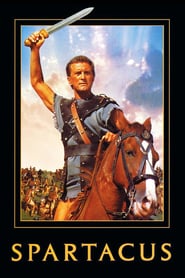
My favorite director of all time is Stanley Kubrick, who made only 13 films throughout his illustrious career. Of all his movies, the only one for which he did not have complete artistic control over was, “Spartacus”. Kubrick was brought into the project after its initial director, Anthony Mann, was fired by Kirk Douglas.
In addition to having the main starring role in the film, Douglas also served as the movie’s Producer. Spartacus is a large Hollywood epic, made at the crossroad period of a Hollywood trying to pull itself out of its conservative blacklisting past and ultra-moral censorships.
Kubrick hated the script he had to work with and consistently tried to make changes during the production. I believe that Spartacus retains its accessibility today due to some of Kubrick’s success in making changes. The great director would later state that in this film he had everything he needed to make a good movie except a script. The script he had was written by the at the time black listed left wing author Dalton Trumbo, and based on the Novel written by left wing author Howard Fast. For Trumbo and Fast it was important to portray Spartacus as a hero and martyr. Kubrick wanted to blur the lines and was loath to show that any war could be shown as pure from any one side.
The film is based on the leader of the great slave revolt in pre-Christ Rome and the ensuing third servile war. Spartacus (Douglas), was born a slave and as a teenager sold into the mining pits of Libya. While being sentenced to death for biting a Roman Guard he is noticed by slave trader Lentulus Batiatus (The wonderful Peter Ustinov), who proceeds to buy him for his gladiator school. It is my belief that Kubrick had his greatest influence in the scenes that take place in this school of warriors. There is quite a lot of similarities to the gladiator training depicted here to the basic training scenes from Kubrick’s war masterpiece, “Full Metal Jacket”. There is the tyrannical head trainer Marceilus (Charles McGraw), whose cruelty matches that of the drill sergeant Hartman from the much later film.
When two powerful Romans visit the school with their spoiled wives, Spartacus is tasked in fighting to the death for their entertainment pleasure. His opponent is a large powerful Ethiopian slave, who secretly likes and admires Spartacus. The battle scene of two trained killers, between Spartacus and this warrior is majestic in its scope and feel. The action is matched by the tension, ending in the Ethiopian preferring to die, then kill his friend. Something that Spartacus makes clear, he was willing to do. It is this sacrifice that enrages the rest of the gladiators enough to revolt, take over the school and start a gladiator army that attacks nearby villages while adding more and more freed slaves to its arsenal, until it is big enough to threaten great Rome.
One of the powerful Romans who visited the school was Marcus Licinius Crassus (the great Laurence Olivier), who is in the process of trying to take over democratic Rome with an authoritarian rule lead by himself. His opponent in the Roman Senate is Gracchus (The no less magnificent Charles Laughton). Seeing Olivier and Laughton act together in scenes of intrigue and power is one of the delights of the movie. The scenes in Rome have the superior actors and are fascinating in their fairly accurate depictions of intrigue and deceit.
If only the depictions of the slave army run by Spartacus were as honest. Trumbo took great pains in depicting the films hero as being close to faultless. He is not cruel, or ambitious. All he wants to do is leave the Roman Empire on a ship, a free man, alongside his wife and child.
Other than the gladiator school scenes, Kubrick shines his visual flair during the one great battle scene near the end of the film. His camera has a deep sense of space and none of the countless soldiers and fighters get lost within the scenery. Every corner of the screen is filled with great detail and gritty color that emits an epic scope befitting the grand story being told. These visual wonders are strong enough to override the sometimes weak script and cartoonish depictions that pop up here and there. Listening to Tony Curtis play a Roman with a Brooklyn accent is painful.
While being produced by Douglas to act as a vehicle for his stardom and written by Trumbo as a heroic left leaning parable, Kubrick was still able to imprint his touch and style onto large sections of this 187 minute historical epic. So much so that its spectacular style and vision would be later shown as influencing the great ones later films.
Well worth the over three hour running time, “Spartacus” can be said to be only about half of a Kubrick film. But half is still much better than nothing.

